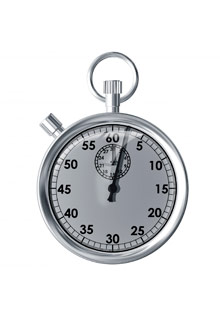4 Mini Workouts

Photo: © 2009 Jupiterimages Corporation
If you think only epic workouts produce results, think again. New research suggests that brief activity bursts can pay off big.
20 minutes a week—Lower Your StressAfter reviewing the lifestyles of nearly 20,000 of their countrymen, British researchers found that 20 minutes a week of moderate activity (such as golfing, gardening, walking, or doing chores) was all it took to significantly reduce the risk of psychological distress.
70 minutes a week—Gain Endurance
Researchers at Ontario's McMaster University asked eight people to alternate 30-second sprints on a stationary bicycle with four minutes of rest. After doing four to seven intervals three times a week for two weeks, the sprinters posted big gains: On an endurance test in which the subjects pedaled until they got tired, they completed an average of 51 minutes, up from 26 minutes.
10 minutes a day—Get More Energy, Lift Your Mood
Researchers at Northern Arizona University asked 21 college students to rate their vigor, fatigue, and mood before—and shortly after—cycling for 10, 20, and 30 minutes. After 10 minutes on a stationary bike, their energy and mood improved considerably. The 20-minute workout provided only a tiny boost over the 10-minute lift; by 30 minutes, energy levels and mood had fallen slightly below the 10-minute peak.
65 minutes a week—Help Prevent Diabetes
The catch? The effort has to be intense. British researchers asked 16 exercisers to spin at full speed on a stationary bike for 30 seconds four to six times, with a four-minute rest between sprints. They did this regimen three times a week for two weeks. At the end of the trial, participants' insulin function had improved by 23 percent. (Enhancing insulin function can lower the risk of diabetes.)
Try It: Three 10-minute workouts from New York trainer Michael Gonzalez-Wallace
More Small But Powerful Life Changes:
As a reminder, always consult your doctor for medical advice and treatment before starting any program.



